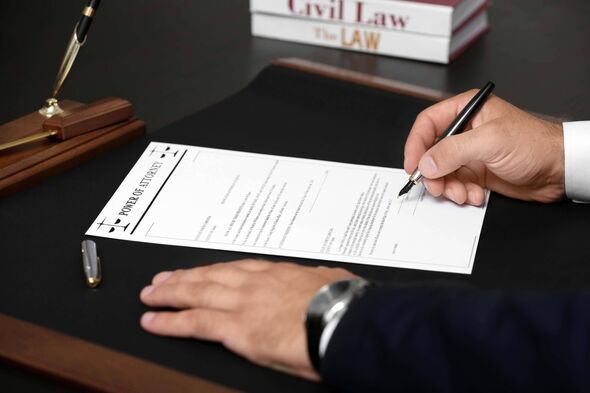

A lasting power of attorney represents a crucial legal document that designates someone - your 'attorney' - to make decisions on your behalf. Making significant decisions, such as establishing a lasting power of attorney, can seem daunting and overwhelming, but it's an essential document to have in place.
To help clarify the legal details and demystify the process, we spoke with solicitor Lara Barton, partner in the private client department at Hunters Law LLP, who has broken down what a lasting power of attorney is, why it's so vital, and what you need to know about getting it established.
What is a lasting power of attorney?"A lasting power of attorney (LPA) is a document whereby somebody appoints an individual or individuals to make decisions on their behalf when they no longer have the mental capacity to make those decisions themselves.
"It comes into effect when someone has had a dramatic health issue, like a stroke, for example, or they've had an accident and are in a coma, or it could be because of some sort of degenerative disease whereby they're slowly reducing capacity, such as dementia. Alternatively, it could be that someone has gone into hospital for quite a big operation and they will be out of action on heavy medication for a while and can't make decisions during that period."
There are two types of LPA: a health and welfare LPA for decisions about your medical care, where you live, and your daily routine, and a property and financial affairs LPA for managing your money, bank accounts, property, and other assets, explains Barton. You can appoint the same person to act as attorney for both your health and welfare and your property and financial affairs, or you can appoint different people for each, according to the government website.
"It's important to think about who you trust the most in terms of different aspects," says Barton. "So, if we're talking about a financial and property LPA, choose someone who is going to manage your finances and act in your best interests at all times."
 How does an ordinary power of attorney differ?
How does an ordinary power of attorney differ?
"An ordinary power of attorney is granted by somebody who has capacity and it typically will last for a finite period and will be put in place to deal with a specific purpose/issue," explains Barton.
"For example, we quite often see them put in place where someone is working abroad in a part of the world that is bit inaccessible and communications aren't very good and they need someone to actively manage assets for them at home while they're gone."
Is it possible to appoint more than one lasting power of attorney?"Yes, you can appoint more than one attorney," says Barton. "People will often appoint two or three, but if you get beyond that it can become a bit cumbersome and the risk of conflict increases between the attorneys."
When you designate multiple attorneys for a LPA, you can have them operate either jointly or jointly and severally.
"A joint appointment is where all decisions have to be made by all the attorneys so they can't act in isolation, which can be quite impractical," says Barton. "For example, say one attorney is on holiday and out of contact, the other attorney can't step in and make decisions without them during that period. The second way of appointing joint attorneys is on a joint and several basis, which is more flexible, because it means that they can either act together or independently."
When is the right time to set up a lasting power of attorney?You can only establish a LPA if you possess mental capacity to do so, making it crucial to arrange it before it becomes too late.

"I think everybody should be thinking about it if you've got assets (like property), money in the bank that you care about and/or financial obligations as well," says Barton. "Then equally, if you've got family or people that rely on you, in that regard, I think there's never a time that's too soon to sort it out. When people come to see us about their will instructions, however old they may be, we will always ask them about lasting power of attorney."
What dangers do people encounter if they fail to establish a LPA or delay too long?Postponing for too long could result in you no longer being legally capable of creating one, compelling your family members to pursue court proceedings to handle your matters.
"If you do leave it too late, it can become very difficult," says Barton. "It can mean there is a very long window where a person has nobody who is able to take decisions on their behalf. In these circumstances, you will often end up with a GP and social services getting quite closely involved.
"If somebody loses capacity and don't have an LPA, the only option is to go to the Court of Protection which is very time consuming and very expensive. It can leave that person and their family in the most dire situation."
How much time does registration require and what steps are involved in the procedure?There are two documents to fill out, one for the health representative and one for the financial representative.
"These forms have been created so that the layman can put these in place without any professional advice or guidance," says Barton. "There's an area on the government website where you can access the forms and create them entirely online and they currently cost £82 each. But, as the law currently stands, you still have to print them and then provide a wet ink signature when they're completed."
Nevertheless, some individuals employ a solicitor to assist them through the procedure and provide personalised legal counsel. "If you've got a lawyer advising you about them, they will tell you all the ins and outs about particular clauses that you can include that might be well suited to your financial set-up or your family circumstances which you might miss if you're doing it yourself," says Barton.
Once all the paperwork is completed and signed, a certificate provider is also required to sign it.
"Their role is just to make sure that the person creating the LPA hasn't been put under any undue influence, there's been no fraud and that they understand exactly what they're doing," explains Barton. "Quite often that might be a GP, it might be a lawyer, it might be a trusted friend or confidant - but can't be a family member - and then ultimately, the attorneys will sign it.
"The forms will then get sent off to the Office of Public Guardian for registration and that currently takes between eight and 10 weeks if they've got no queries or no concerns to raise."
What are the common mistakes people often make when filling out the forms?There is a very strict signing order for an LPA - 1. Donor, 2. Certificate Provider, 3. Attorneys - and Barton explains that failing to sign in this sequence is a common mistake that can lead to the Office of the Public Guardian rejecting the form, necessitating a new application and potentially additional fees.
"Unclear handwriting can also cause a problem," warns Barton. "It can actually cause the whole LPA to become invalid purely because a witness has written their address a bit messily which can be very frustrating. The forms need to be completed very carefully and the guidance notes should be followed extremely carefully."
She further adds that providing contradictory instructions can also render the form invalid. For more information, visit gov.uk/power-of-attorney